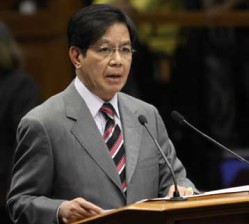Lacson: ‘Laying down’ arms, renegade groups key issues in MILF peace process
CAMP VICENTE LIM, Laguna—Sen. Panfilo Lacson stressed the importance of disarming the Moro Islamic Liberation Front (MILF) in the peace process in Mindanao as the Philippine government and the MILF thresh out the details of the framework agreement they both recently signed.
“Kasama ‘yon (That is included), the laying down of firearms, but gradual,” Lacson said Monday.
Lacson, who chairs the Senate committee on defense and a former director general of the Philippine National Police, first raised his concern that the Bangsamoro, which would replace the Autonomous Region for Muslim Mindanao (ARMM), might form its own police force.
He said Interior and Local Government Secretary Mar Roxas allayed this concern when the latter “gave an assurance” that the country would continue to have only one national police force with jurisdiction even in the Bangsamoro region.
“My only concern is if ‘integration’ will mean that the MILF forces will constitute the core of the local police forces, what should be the process?” he asked.
Article continues after this advertisementThe Aquino administration and the MILF signed on Oct. 15 the framework agreement that would lead to the establishment of an autonomous Bangsamoro region with a bigger territory and more powers. The peace pact was also seen as a means to achieve lasting peace in Mindanao.
Article continues after this advertisementLacson said several issues, among them the handling of renegade groups, should be discussed in details by the government and the MILF.
Senator Gregorio Honasan, meanwhile, said the peace accord was “a good first step” to a still long process in finding peace in Mindanao.
Honasan and Lacson were guests at the turnover of computer units and radio equipment of the Philippine National Police (PNP) Foundation to the Calabarzon (Cavite, Laguna, Batangas, Rizal, Quezon) police headquarters here on Monday.
Both senators, who were members of the Philippine Military Academy Class ’71, the soldiers who were deployed to the field during martial law, when the communist and Moro insurgencies broke out in the countryside, expressed high hopes for the success of the peace effort despite threats from Moro leader Nur Misuari that the framework might only worsen the conflict in Mindanao. Misuari heads the Moro National Liberation Front from which the MILF broke away in 1977.
Honasan said Misuari’s statement reminding MNLF fighters of their “armed struggle” did not surprise him and should not in any way threaten the government.
“I would be more surprised if they did not speak. They should not bear arms, however,” Honasan said.
He said the message that should be put across to all armed groups would be for them to not prejudge the peace process with MILF, see first if it would succeed, and find confidence building measures that could eventually lead to them also entering in the same peace agreement with the government.
